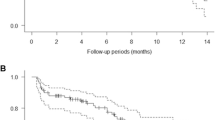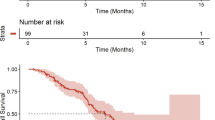Summary
Background: The objective of ECOG 1503 was to determine the response rate of this combination in the second-line treatment of advanced NSCLC. Methods: Triapine 105 mg/m2 IV on days 1, 8, and 15, and gemcitabine 1,000 mg/m2 on days 1, 8, and 15, of a 28 day cycle. Results: Eighteen patients enrolled. Three patients were not eligible due to protocol violations. No objective antitumor responses were seen. Three patients (20%) experienced stable disease (90% CI 5.7–44%). Median overall survival: 5.4 months (95% CI 4.2–11.6 months); median time to progression: 1.8 months (95% CI 1.7–3.5 months). Five patients developed acute infusion reactions to Triapine® related to elevated methemoglobinemia. Patients with MDR1 variant genotypes of C3435T experienced superior overall survival compared to non-variants (13.3 vs. 4.3 months, respectively, p = 0.023). Conclusion: This regimen did not demonstrate activity in relapsed NSCLC. Prolonged survival seen with MDR1 variant genotypes is hypothesis-generating.



Similar content being viewed by others
References
Schiller JH, Harrington D, Belani CP et al (2002) Comparison of four chemotherapy regimens for advanced non-small-cell lung cancer. N Engl J Med 346:92–98 doi:10.1056/NEJMoa011954
Crino L, Mosconi AM, Scagliotti G et al (1999) Gemcitabine as second-line treatment for advanced non-small-cell lung cancer: a phase II trial. J Clin Oncol 17:2081–2085
Brodowicz T, Krzakowski M, Zwitter M et al (2006) Cisplatin and gemcitabine first-line chemotherapy followed by maintenance gemcitabine or best supportive care in advanced non-small cell lung cancer: a phase III trial. Lung Cancer 52:155–163 doi:10.1016/j.lungcan.2006.01.006
Murren J, Modiano M, Clairmont C et al (2003) Phase I and pharmacokinetic study of triapine, a potent ribonucleotide reductase inhibitor, administered daily for five days in patients with advanced solid tumors. Clin Cancer Res 9:4092–4100
Yu Y, Wong J, Lovejoy DB et al (2006) Chelators at the cancer coalface: desferrioxamine to Triapine and beyond. Clin Cancer Res 12:6876–6883 doi:10.1158/1078-0432.CCR-06-1954
Finch RA, Liu M, Grill SP et al (2000) Triapine (3-aminopyridine-2-carboxaldehyde- thiosemicarbazone): a potent inhibitor of ribonucleotide reductase activity with broad spectrum antitumor activity. Biochem Pharmacol 59:983–991 doi:10.1016/S0006-2952(99)00419-0
Sigmond J, Kamphuis JA, Laan AC et al (2007) The synergistic interaction of gemcitabine and cytosine arabinoside with the ribonucleotide reductase inhibitor triapine is schedule dependent. Biochem Pharmacol 73:1548–1557 doi:10.1016/j.bcp.2007.01.025
Chen CH, King I, Belcourt M et al (2002) Triapine, a ribonucleotide reductase inhibitor, enhances incorporation of gemcitabine into DNA and cytoxicity to KB cells. Proc AACR-EORTC conference 38:S26 (abstract 71)
Yen Y, Margolin K, Doroshow J et al (2004) A phase I trial of 3-aminopyridine-2-carboxaldehyde thiosemicarbazone in combination with gemcitabine for patients with advanced cancer. Cancer Chemother Pharmacol 54:331–342 doi:10.1007/s00280-004-0821-2
Kaufman DC, Chabner BA (2001) Clinical strategies for cancer treatment: the role of drugs. In: Chabner BA, Longo DL (eds) Cancer chemotherapy and biotherapy: principles and practice, 3rd edn. Lippincott, Williams, and Wilkins, Philadelphia, pp 1–16
Leslie EM, Deeley RG, Cole SP (2005) Multidrug resistance proteins: role of P-glycoprotein, MRP1, MRP2, and BCRP (ABCG2) in tissue defense. Toxicol Appl Pharmacol 204:216–237 doi:10.1016/j.taap.2004.10.012
Rappa G, Lorico A, Liu MC et al (1997) Overexpression of the multidrug resistance genes mdr1, mdr3, and mrp in L1210 leukemia cells resistant to inhibitors of ribonucleotide reductase. Biochem Pharmacol 54:649–655 doi:10.1016/S0006-2952(97)00210-4
Kerb R, Hoffmeyer S, Brinkmann U (2001) ABC drug transporters: hereditary polymorphisms and pharmacological impact in MDR1, MRP1 and MRP2. Pharmacogenomics 2:51–64 doi:10.1517/14622416.2.1.51
Attia S, Kolesar J, Mahoney MR et al (2008) A phase 2 consortium (P2C) trial of 3-aminopyridine-2-carboxaldehyde thiosemicarbazone (3-AP) for advanced adenocarcinoma of the pancreas. Invest New Drugs 26:369–379 doi:10.1007/s10637-008-9123-6
Marzolini C, Paus E, Buclin T et al (2004) Polymorphisms in human MDR1 (P-glycoprotein): recent advances and clinical relevance. Clin Pharmacol Ther 75:13–33 doi:10.1016/j.clpt.2003.09.012
Kim RB, Leake BF, Choo EF et al (2001) Identification of functionally variant MDR1 alleles among European Americans and African Americans. Clin Pharmacol Ther 70:189–199 doi:10.1067/mcp.2001.117412
Pan JH, Han JX, Wu JM et al (2009) MDR1 single nucleotide polymorphism G2677T/A and haplotype are correlated with response to docetaxel-cisplatin chemotherapy in patients with non-small-cell lung cancer. Respiration. doi:10.1159/000158454
Rudin CM, Liu W, Desai A et al (2008) Pharmacogenomic and pharmacokinetic determinants of erlotinib toxicity. J Clin Oncol 26:1119–1127 doi:10.1200/JCO.2007.13.1128
Ma B, Goh BC, Tan EH et al (2008) A multicenter phase II trial of 3-aminopyridine-2-carboxaldehyde thiosemicarbazone (3-AP, Triapine) and gemcitabine in advanced non-small-cell lung cancer with pharmacokinetic evaluation using peripheral blood mononuclear cells. Invest New Drugs 26:169–173 doi:10.1007/s10637-007-9085-0
Gautam A, Bepler G (2006) Suppression of lung tumor formation by the regulatory subunit of ribonucleotide reductase. Cancer Res 66:6497–6502 doi:10.1158/0008-5472.CAN-05-4462
Gautam A, Li ZR, Bepler G (2003) RRM1-induced metastasis suppression through PTEN-regulated pathways. Oncogene 22:2135–2142 doi:10.1038/sj.onc.1206232
Zheng Z, Chen T, Li X et al (2007) DNA synthesis and repair genes RRM1 and ERCC1 in lung cancer. N Engl J Med 356:800–808 doi:10.1056/NEJMoa065411
Davidson JD, Ma L, Flagella M et al (2004) An increase in the expression of ribonucleotide reductase large subunit 1 is associated with gemcitabine resistance in non-small cell lung cancer cell lines. Cancer Res 64:3761–3766 doi:10.1158/0008-5472.CAN-03-3363
Bepler G, Kusmartseva I, Sharma S et al (2006) RRM1 modulated in vitro and in vivo efficacy of gemcitabine and platinum in non-small-cell lung cancer. J Clin Oncol 24:4731–4737 doi:10.1200/JCO.2006.06.1101
Bepler G, Sharma S, Cantor A et al (2004) RRM1 and PTEN as prognostic parameters for overall and disease-free survival in patients with non-small-cell lung cancer. J Clin Oncol 22:1878–1885 doi:10.1200/JCO.2004.12.002
Wong SJ, Myette MS, Wereley JP et al (1999) Increased sensitivity of hydroxyurea-resistant leukemic cells to gemcitabine. Clin Cancer Res 5:439–443
Duxbury MS, Ito H, Zinner MJ et al (2004) RNA interference targeting the M2 subunit of ribonucleotide reductase enhances pancreatic adenocarcinoma chemosensitivity to gemcitabine. Oncogene 23:1539–1548 doi:10.1038/sj.onc.1207272
Souglakos J, Boukovinas I, Taron M et al (2008) Ribonucleotide reductase subunits M1 and M2 mRNA expression levels and clinical outcome of lung adenocarcinoma patients treated with docetaxel/gemcitabine. Br J Cancer 98:1710–1715 doi:10.1038/sj.bjc.6604344
Acknowledgments
The authors thank the patients who participated in this trial, as well as the investigators who enrolled patients, and the data managers, and the clinical and research nurses who brought this trial to completion. This study was conducted by the Eastern Cooperative Oncology Group (Robert L. Comis, M.D., Chair) and supported in part by the University of Wisconsin Paul P. Carbone Comprehensive Cancer Center K12 CA087716 and 5 P30 CA014520-35, and by the Public Health Service Grants CA23318, CA66636, CA21115, CA21076, and from the National Cancer Institute, National Institutes of Health and the Department of Health and Human Services. Its contents are solely the responsibility of the authors and do not necessarily represent the official views of the National Cancer Institute.
Author information
Authors and Affiliations
Corresponding author
Additional information
This study was conducted by the Eastern Cooperative Oncology Group (Robert L. Comis, M.D., Chair) and supported in part by the University of Wisconsin Paul P. Carbone Comprehensive Cancer Center K12 CA087716 and 5 P30 CA014520-35, and by the Public Health Service Grants CA23318, CA66636, CA21115, CA21076, and from the National Cancer Institute, National Institutes of Health and the Department of Health and Human Services. Its contents are solely the responsibility of the authors and do not necessarily represent the official views of the National Cancer Institute.
Rights and permissions
About this article
Cite this article
Traynor, A.M., Lee, JW., Bayer, G.K. et al. A phase II trial of Triapine® (NSC# 663249) and gemcitabine as second line treatment of advanced non-small cell lung cancer: Eastern Cooperative Oncology Group Study 1503. Invest New Drugs 28, 91–97 (2010). https://doi.org/10.1007/s10637-009-9230-z
Received:
Accepted:
Published:
Issue Date:
DOI: https://doi.org/10.1007/s10637-009-9230-z




